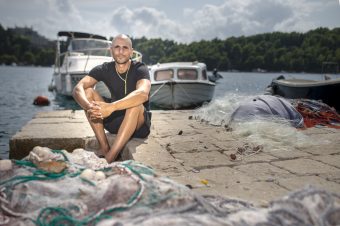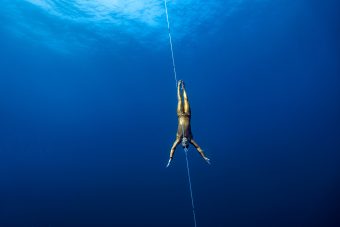
Although it is imposed on him, due to his job and career, to watch seas and oceans from a different perspective than most people and, therefore, he notices what is hidden on the dark bottom, the famous Croatian diver, Goran Colak believes that people around the world are aware of the amount of waste we are surrounded by. The recorder in free diving confirms that part of that waste has found its place on beaches that look different than thirty years ago.
Goran believes that the problem is underdeveloped people’s awareness of how alarming this situation is. “People don’t understand the real damage and danger of plastic and microplastic. Everyone is busy with primary survival, especially in countries like yours and mine, but still, it isn’t hard to refrain from throwing plastic bottles in the street or the sea. It requires no effort, just common sense.”
As an experienced diver who travels very often and dives in different parts of the world, Goran has a lot to say about the situation outside the Adriatic, which he finds extremely polluted, even more than the average tourist on the Adriatic coast can see. “Wherever I dived in the Adriatic, I was greeted by the sea. But the sea of bottles, bags, tires, wreckages, and boilers. Winds and sea currents bring additional, huge amounts of garbage from Albania, which linger in coves. When I was diving in Mljet, I was seeing that all the time. However, we are still clean compared to some economically less developed countries.”
Pollution, he says, knows no boundaries. “When you look at the planet from the orbital perspective, there are no boundaries, just one big closed ecosystem that we are all in together, whether you like it or not.” The absence of a waste separation culture is considered as a big problem, and it should be the first step in solving the problem of plastic waste.
Still, he believes there is a cure. “Small advances of individuals can make a huge difference. If each one of usrecycled his one waste or just disposed of it improperly, the situation would be much better.”
In focus:

It seems a bit pointless, Goran explained vividly, if “we clean and the others dump the garbage on the other side of the fence”, alluding to the need for everyone to participate in the fight against waste. The most logical order of work to solve this problem involves reducing the amount of waste which every person produces every person individually, then local units, state and governments, down to the global level.
Indeed, there are numerous inventions and actions that contribute to attempts to prevent the accumulation of waste around the world. Recently, a group of Dutch researchers introduced a cleaning project, which also enables the collection of microplastics and tried it out in the Pacific.
“The microplastics made up of the smallest particles, created by the decomposition of plastic, currently form an integral part of the living world in the sea. That’s where they get into us,” says this world-renowned freediver who joined the appeal of Split-based organisation Green Sail in June to send a clear message to his fellow citizens about the need for personal responsibility in waste management. It is crucial that we take immediate steps regarding using plastic while there is still time, says Goran.
In his opinion, information about these problems is not sufficiently represented, at least not in our society. Consequently, people are neither informed nor aware of the danger to a sufficient degree.
“By no means do we realise that all of this is our common problem, and as such, it concerns everyone, without exception. We need to be aware that we have to save ourselves alone because the planet can function without us since it goes through constant periods of renewal” warns Goran adding that all we need to do is be guided by common sense – we should ask ourselves where in our yard or house to dispose of waste that we will take care of later.
Prepared by: Jelena Cvetic
This article was published in the new issue of the Energy portal Magazine GRINNOVATIONS, December 2019 – February 2020.



